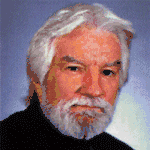Paul Grant (physicist)
Paul Michael Grant is an American/Irish physicist and science writer who was involved in discovering and elucidating the structure of Yttrium Barium Copper Oxide which was important as the first high temperature superconductor to exhibit superconductivity above the boiling point of Nitrogen.[2][3] He was a co-author of IBM's US patent application covering their preparation.[4][5][6][7]
Paul Grant | |
|---|---|
 Paul Grant | |
| Born | May 9, 1935 Poughkeepsie, New York, USA |
| Alma mater | Clarkson University, Harvard University |
| Occupation(s) | Physicist, Science-Writer |
| Employer(s) | IBM, EPRI, W2AGZ[1] |
| Awards |
|
Highlights
Grant joined IBM Poughkeepsie, NY in 1953 working as a technician on the SAGE computer defense system.[8] He was able to take advantage of IBM's educational leave-of-absence program to obtain a BS degree from Clarkson and a Ph.D. from Harvard.[9] In 1957, he filed a patent[10] that is cited as a precursor to the magnetoresistive head used universally in magnetic recording. In 1965, he moved to IBM Research – Almaden. At IBM, Grant was among the team researching superconductivity in the material Yttrium Barium Copper Oxide (YBCO) and found it to exhibit superconductivity at temperatures as high as 90 K.[2] This was some of first evidence that superconductivity could be supported at temperatures above the boiling point of Nitrogen, a common cryogenic refrigerant.
In 1987–88, with guidance from Grant, his 8th-grade daughter, Heidi, and then subsequently a science class at Gilroy High School were able to show the relative ease with which high temperature superconductors could be fabricated and demonstrated[11][12][13]
From 1990 to 1993, Grant was a “visiting faculty researcher” at the Instituto de Investigationes Materiales (IIM), National Autonomous University of Mexico (UNAM), where he carried out numerical studies on the properties of rare earth copper oxides. From 1993 to 2004, Grant was a Science Fellow with the Electric Power Research Institute (EPRI).
From 2005 to 2008, he was a visiting scholar in applied physics at Stanford University
In 2004, he started his own consulting business.[1][5] Grant has long been an advocate for commercial applications of superconductivity.[14][15] He is a popular science writer[11][16][17][18] and has been prolific author of scientific papers and patents.[19][20] Grant is a member of the Storage Interest Group[21] at the Computer History Museum.
Patent dispute
In 2000, a patent dispute over the invention of YBCO dating back to March 1987 was finally resolved. The dispute was between IBM's Almaden Research Center, the US Naval Research Laboratory, the University of Houston, and Bell Labs. Ultimately, Bell Labs. prevailed and was granted the US patent based on priority date (date of invention rather than the current criterion of date of filing)[22][23]
Recognition and awards
Grant became a Senior Fellow of the American Physical Society in 1998 "For contributions to the fields of organic conductors and high temperature superconductivity".[24] He became a Fellow of the Institute of Physics, United Kingdom, in Nov 2004. In 2013, Grant was chosen as American Physical Society Distinguished Lecturer on the Applications of Physics.[25] Grant is one of Clarkson University's "Notable Knights".[26]
References
- W2AGZ website
- Grant, P. M.; Beyers, R. B.; Engler, E. M.; Lim, G.; Parkin, S. S. P.; Ramirez, M. L.; Lee, V. Y.; Nazzal, A.; Vazquez, J. E.; Savoy, R. J. (1987). "Superconductivity above 90 K in the compound YBa2Cu3Ox: Structural, transport, and magnetic properties". Physical Review B. 35 (13): 7242–7244. doi:10.1103/PhysRevB.35.7242. PMID 9941013.
- A. Malozemoff et al., "Superconductivity at IBM - a Centennial Review: Part II – Materials and Physics", IEEE/CSC & ESAS European Superconductivity News Forum, No. 20, July 2012
- Canadian Patent CA1341623C refers to US provisional patent application US2465387A filed 1987-03-11
- W2AGZ Paul Grant biography
- Clarkson University Biography: Paul Grant
- Grant, Paul (2001). "Rehearsals for prime time". Nature. 411 (6837): 532–533. doi:10.1038/35079212. PMID 11385548. S2CID 4423073.
- Computer History Museum: SAGE Defense System
- IBM Kingston News, Vol. 5, No. 21, May 25, 1960
- US Patent 3016507, "Thin film magneto resistance device" 1962-01-09
- P. Grant, "Do-it-yourself superconductors", New Scientist, pp. 36-38 30 July 1987
- M. Browne, "Superconductivity Moves From the Laboratory to the Classroom" NY Times, Jan. 12, 1988
- IBM Research Blog, June 2011
- Physics World video, "Where next for superconductivity", 6th Apr. 2011
- P. Grant, "The Energy Supergrid"
- P. Grant, "Hydrogen lifts off — with a heavy load", Nature Vol. 424, 10 July 2003
- Grant, Paul M. (2002). "London calling". Nature. 420 (6917): 743–744. doi:10.1038/420743a. S2CID 38765396.
- P. Grant, C. Starr, T. Overbye, "A power grid for the hydrogen economy", Scientific American, pp. 77-83, July 2006
- Google Citations: Paul Grant
- Paul Grant publications and patents
- Storage Interest Group, Computer History Museum, Mountain View, California
- Tony Feder, "Bell Labs Wins Long-Running Patent Battle over High-Tc Superconductor", Physics Today 53, 4, 56 (2000)
- MacIlwain, Colin (2000). "Bell Labs win superconductivity patent". Nature. 403 (6766): 121–122. doi:10.1038/35003008. PMID 10646568. S2CID 1120705.
- APS Fellow Archive
- APS Newsletter Fall 2013 "Paul Grant chosen as the 2014 Distinguished Lecturer"
- Clarkson University Notable Knights